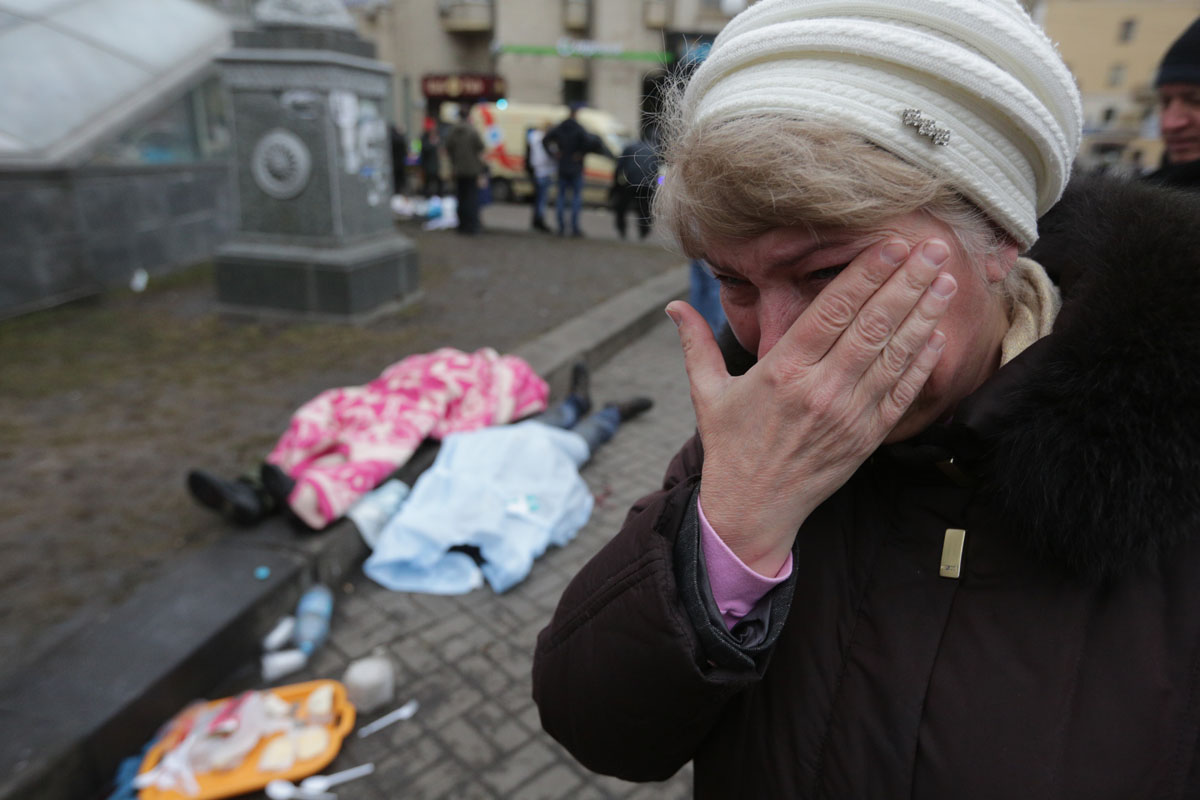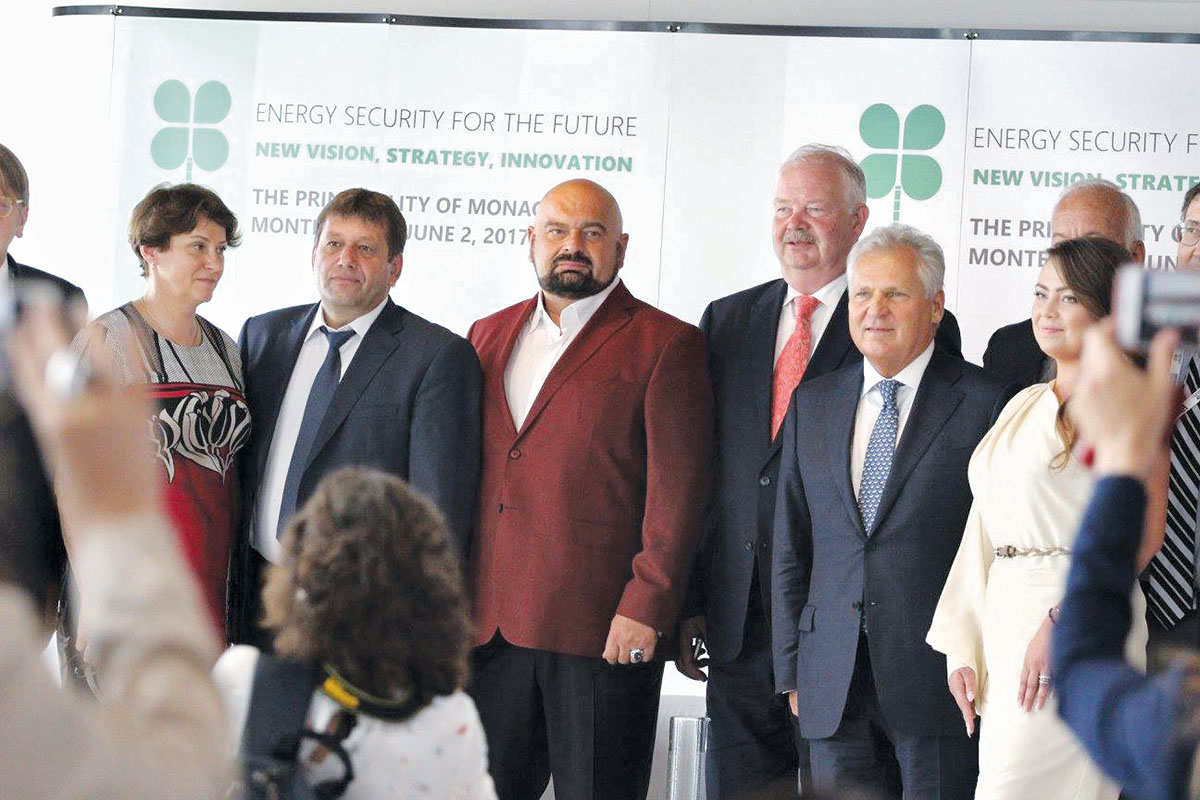See a related story here.
On the fourth anniversary of the murders of 78 EuroMaidan protesters on Feb. 18–20, 2014, Ukrainian authorities set up portraits of the victims on Maidan Nezalezhnosti in Kyiv. The authorities are also planning to build a memorial complex on Instytutska Street.
But there’s still no justice.
Law enforcers “should have done more,” President Petro Poroshenko said on Feb. 18. “At the same time, I realize the scale of the crimes, as well as the necessity of having legally sound evidence and adherence to all procedural norms.”
These solemn statements and commemorative ceremonies look like empty gestures to many people since not a single person has been convicted for murders during the revolution that drove President Viktor Yanukovych from power on Feb. 22, 2014.
Six ex-Berkut riot police officers are currently on proper trial for the murders but all the other ongoing EuroMaidan trials face constant delays or obstruction, said Vitaly Tytych, a lawyer for killed EuroMaidan demonstrators.
Prosecutor General Yuriy Lutsenko said on Feb. 18 that the in absentia case against the suspected organizers of EuroMaidan murders, including Yanukovych, ex-Interior Minister Vitaly Zakharchenko and ex-Security Service of Ukraine Chief Oleksandr Yakymenko, will be sent to trial after the high treason trial against Yanukovych is completed.
Yanukovych is currently on trial in absentia in a high treason case for urging Russian troops to invade Ukraine. Lutsenko presents the case as a major breakthrough while others view it as a publicity stunt.
The in absentia cases against the organizers of EuroMaidan murders and into Yanukovych-era corruption can’t be sent to trial because Ukrainian authorities have failed to bring Ukrainian law on in absentia trials in line with international law, according to Sergii Gorbatuk, head of the in absentia investigations unit at the prosecutor’s office.
Only one person — a pro-government thug, or titushka — is currently in jail for violence against EuroMaidan protesters. Lutsenko has boasted that 42 other people had been convicted for EuroMaidan crimes, but they received only fines and suspended prison terms.
Meanwhile, in December, a Kyiv court triggered a controversy by giving a 4-year suspended sentence to Yuriy Krysin, a leader of pro-government thugs who killed journalist Vyacheslav Veremiy during the EuroMaidan Revolution.
Out of the top Yanukovych allies currently in Ukraine, only one — ex-Justice Minister Oleksandr Lavrynovych — is currently on trial in a corruption case. Most of them have escaped any charges and even keep their jobs.
Most Yanukovych-era top officials who are hiding abroad have been taken off Interpol’s wanted list, and several cases against them have been closed.
The European Union has already lifted sanctions on seven top Yanukovych associates because Ukraine provided no evidence to keep them in place. These include Yanukovych’s ex-Deputy Chief of Staff Andriy Portnov, the ex-president’s late son Viktor, ex-Health Minister Raisa Bohatyryova, ex-Security Service of Ukraine Chief Oleksandr Yakymenko, ex-Prime Minister Mykola Azarov, ex-Security Service of Ukraine Chief Ihor Kalinin and ex-lawmaker Yuriy Ivanyushchenko.
The European Court of Justice on Feb. 21 also ordered European authorities to lift sanctions imposed on lawmaker Serhiy Klyuyev.
The authorities’ critics suspect that the lack of progress could have been caused by corrupt dealings between Yanukovych cronies and incumbent top officials. Moreover, evidence has been piling up that Poroshenko allies, including his ex-Chief of Staff Boris Lozhkin, his personal banker Makar Paseniuk and ex-National Bank of Ukraine Chief Valeria Gontareva, could have been implicated in the Yanukovych regime’s corruption schemes. They deny the charges.
“(Top officials) reached certain deals with Yanukovych allies,” Tytych said. “And Gorbatuk didn’t want to sabotage and close those cases.”

A woman cries as she stands on Maidan Nezalezhnosti on Feb. 20, 2014, beside the bodies of two protesters shot dead by police snipers. (Kostyantyn Chernichkin)
Obstruction of cases
Gorbatuk has directly accused Poroshenko, Lutsenko and Interior Minister Arsen Avakov of sabotaging EuroMaidan cases. They deny the accusations.
In 2016 Lutsenko transferred many Yanukovych-era graft cases from Gorbatuk’s department to another unit.
Tytych told the Kyiv Post that the authorities had effectively destroyed Gorbatuk’s department and blocked all EuroMaidan investigations in an effort to cover up for top incumbent officials implicated in the cases.
“(Lutsenko) eliminated all the links in evidence that were established by the investigators and broke up the investigative groups,” Tytych said. “And the cases that were taken away from Gorbatuk were derailed.”
Meanwhile, procedural code amendments signed by Poroshenko in November will make it much more difficult to investigate EuroMaidan cases and Yanukovych-era corruption cases, Reanimation Package of Reform experts and Public Integrity Council members believe. They may lead to the closure of some EuroMaidan cases, according to Gorbatuk.
In November Gorbatuk said that some investigations into EuroMaidan murders had effectively stopped because, under the law, they had to be transferred by the Prosecutor General’s Office to the yet-to-be-created State Investigation Bureau.
Moreover, the liquidation of most lower-level courts by Poroshenko in December will lead to newly-established courts re-considering EuroMaidan cases from scratch unless amendments to the law are passed.
Escaping justice
In October Gorbatuk accused the Interior Ministry’s leadership of covering up for incumbent top police officials Volodymyr Hrynyak, Anatoly Seredynsky and Ihor Babych and Serhiy Pohotov, head of security at state oil firm Naftogaz Ukrainy. These officials, who have not been suspended or fired, are accused of organizing a crackdown on EuroMaidan protesters on Feb. 18–19, 2014.
Hrynyak talked on the phone to then top Berkut official Andriy Tkachenko during the murders of EuroMaidan demonstrators on Feb. 18, 2014. In 2017 Dnipro Mayor Borys Filatov appointed Tkachenko as head of the city’s municipal police.
Gorbatuk also said that up to 20 Interior Ministry officials had not been suspended or fired, despite having been charged in EuroMaidan cases. Previously the Interior Ministry has been accused of protecting ex-Berkut riot police officers charged in EuroMaidan cases. Top officials of Kyiv police have addressed the courts asking not to suspend Berkut officers, and the police have given positive recommendations to Berkut suspects.
Meanwhile, in 2014 to 2017, 27 former Berkut officers charged with murdering and abusing EuroMaidan protesters, including four in 2017, also escaped.
Gorbatuk also argues that many cases have been taken away from his unit to help top officials escape responsibility.
In 2016 to early 2017, graft cases against Yanukovych, ex-Tax and Revenue Minister Oleksandr Klymenko, ex-Ecology Minister Mykola Zlochevsky, ex-Energy Minister Yuriy Boyko, ex-lawmaker Ivanyushchenko, ex-Education Minister Dmytro Tabachnyk, ex-Customs Service Chief Ihor Kaletnyk, ex-Interior Minister Zakharchenko, Yanukovych’s former parliamentary faction chief Oleksandr Yefremov and ex-Agriculture Minister Mykola Prysyazhnyuk were taken away from Gorbatuk’s unit. A kidnapping case against Opposition Bloc lawmaker Vadym Novynsky was also taken away from the department.

Lawmaker Nina Yuzhanina (L), Deputy Prime Minister Volodymyr Kistion (second from L) and ex-Ecology Minister Mykola Zlochevsky (C) attend an energy summit in Monaco on June 2, 2017. (Energy Security for the Future) ((Energy Security for the Future) )
Meanwhile, prosecutors have applied for closing the corruption case against ex-Finance Minister Yuriy Kolobov, saying the terms for the investigation had expired, and it was closed by a court on Feb. 21.
In January 2017 the Prosecutor General’s Office closed the embezzlement case against Zlochevsky, in exchange for him paying Hr 6 billion to the budget.
Earlier in February Zlochevsky was seen in Ukraine, according to Yevropeiska Pravda’s sources.
In June 2017 Zlochevsky was photographed with Nina Yuzhanina, head of parliament’s tax committee and Poroshenko’s former accountant, and Deputy Prime Minister Volodymyr Kistion at an energy summit in Monaco.
In December 2016 journalist Olga Vasilevskaya published what she claimed to be photos of Poroshenko’s top ally and lawmaker Ihor Kononenko meeting in Vienna with Zlochevsky.
Meanwhile, Zlochevsky’s Burisma group had supplied natural gas to firms owned by Poroshenko and his top allies Kononenko and Oleh Gladkovsky, Radio Liberty’s Schemes investigative show reported in 2017.
Oleksandr Onyshchenko, a fugitive lawmaker charged with embezzlement, told the Kyiv Post that Zlochevsky had paid about $80 million to Poroshenko for unfreezing Burisma’s assets in Ukraine.
Onyshchenko also claimed that Zlochevsky had been supplying gas free of charge to Poroshenko’s Piskivka Glass Product Factory as part of the settlement. Zlochevsky and Poroshenko deny the accusations.
Ivanyushchenko was removed from the wanted list in 2016 by a Kyiv court, and in 2017 the Supreme Court closed the case against him, citing inaction by prosecutors.
In 2015 ex-Justice Minister Olena Lukash was arrested in Kyiv in a theft case but subsequently she was released on bail, and even the bail was later canceled.
Lawmaker Serhiy Klyuyev escaped justice despite remaining in Ukraine after the EuroMaidan Revolution. He fled the country after being stripped of immunity in a graft case in 2015.
Meanwhile, Deputy Finance Minister Oksana Markarova has been investigated in a graft case against Yanukovych’s former Chief of Staff Andriy Klyuyev, but has also escaped charges, according to Volodymyr Petrakovsky, a former prosecutor and a Reanimation Package of Reforms expert.
Gorbatuk said that about 40 suspects were expected to be charged in the Klymenko case but escaped prosecution after the case was taken away from his unit in 2016.
Lyudmila Demchenko, head of the State Fiscal Service’s Kyiv branch, and Viktor Dvornikov, an adviser to Kyiv Mayor Vitali Klitschko, were also investigated as part of the Klymenko case, but have not been charged.
In May lawmaker Sergii Leshchenko published the text of what he says is a draft parliament motion to strip Boyko of his immunity from criminal prosecution in an embezzlement case. Leshchenko said the motion was blocked by Lutsenko, which he denies.
Yanukovych’s ex-Chief of Staff Serhiy Lyovochkin and Yanukovych-allied tycoons Dmytro Firtash and Rinat Akhmetov have also escaped any charges in Ukraine whatsoever.
Onyshchenko has claimed that Poroshenko had extorted $180 million from Akhmetov for unfreezing the assets of his oil and gas firm Naftogazvydobuvannya. Poroshenko and Akhmetov deny the accusations.
Meanwhile, Kharkiv Mayor Hennady Kernes, a former Yanukovych ally, has been charged with kidnapping, torturing and threatening to murder EuroMaidan activists. The case against him was sent to court in March 2015 but he is not even under arrest, and the trial has seen no progress due to what critics deem to be his political influence.
Maidan judges
Out of the 351 judges accused of unlawfully trying EuroMaidan activists, only 48 have been fired.
Most of those fired have been reinstated by the High Administrative Court, and their cases are pending at the Supreme Court. The High Council of Justice also recently canceled its decisions to fire 10 judges implicated in cases against EuroMaidan activists.
Last year Poroshenko appointed for life three judges accused of persecuting EuroMaidan activists to ordinary courts and five judges implicated in EuroMaidan cases to the Supreme Court.
Cases against only 16 judges charged with unlawfully trying EuroMaidan demonstrators have been sent to court, and two of them have already been acquitted.
